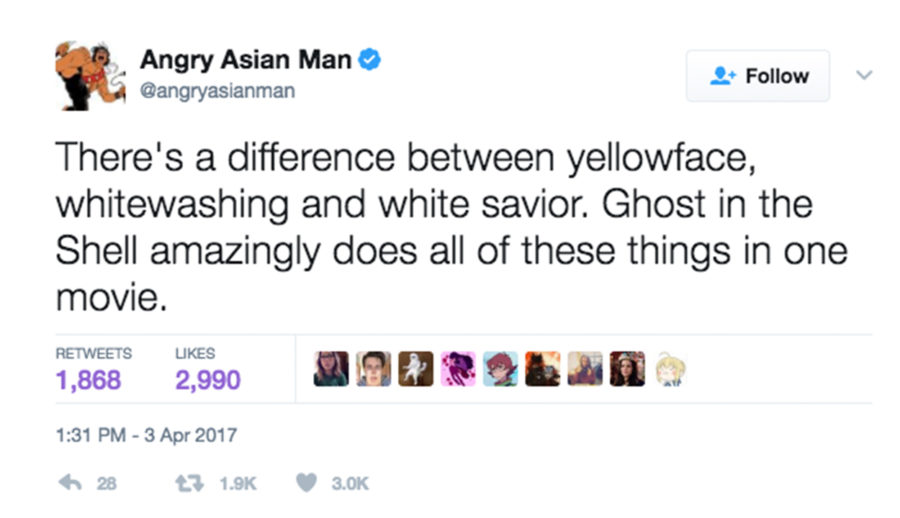With the release of movies like “Death Note,” “Ghost in the Shell,” “Aloha,” “Doctor Strange” and many others that portray white actors in Asian-American roles, whitewashing in the film industry has become a trendy topic to discuss.
Asian-Americans deserve to have their stories told by Asian- American actors, producers and directors. It is extremely frustrating to have to write that sentence in 2017, but my frustration will never compare to the frustration of Asian- American actors constantly being overlooked and Asian-American audiences feeling invisible.
According to the New York Times, Asian-Americans make up 5.4 percent of the population.
Yet according to a study by the University of Southern California Annenberg School for Communication and Journalism in 2016, only one out of 20 speaking roles go to Asian-Americans, and they are given only one percent of lead roles in film.
Unsurprisingly, white actors account for 76.2 percent of lead roles, including the ones they do not deserve. Take for example the 2016 film “The Great Wall,” starring Matt Damon. Damon plays a European mercenary soldier who ends up saving China from monsters near the Great Wall.
While the movie is directed by Chinese director Zhang Yimou and has a decent amount of Asian actors – a ploy to undoubtedly appeal to Chinese audiences in addition to American audiences – the movie serves to reinforce white savior ideology.
In a rant on Twitter, Constance Wu, star on ABC’s show “Fresh Off the Boat,” voiced her frustrations over the casting.
“We have to stop perpetuating the myth that only a white man can save the world,” she wrote. “It is not based in actual fact. Our heroes don’t look like Matt Damon. They look like Malala. Ghandi. Mandela. Your big sister when she stood up for you to those bullies one time.
“If white actors are forgiven for having a box office failure once in a while, why can’t a POC sometimes have one?”
Wu’s question is warranted. Scarlett Johansson’s participation in the new movie “Ghost in the Shell” corroborates the fact that Asian-Americans are being deliberately erased in Hollywood.
“Ghost in the Shell” is based on a Japanese anime series of the same name. Johansson plays the role of Major Motoko Kusanagi, whose name is reduced to “Major” in the film for the sake of Americans being able to pronounce it, and therefore, a subtle whitewashing act. Kusanagi is a cybernetic being housing the brain of a dead Japanese woman.
Because Johansson’s character is fascinating due to her not being a real human being, Johansson and the publisher of the anime used that as an excuse for Johansson being casted.
Johansson called her character “identity-less,” and the spokesperson for Kodansha and the publisher of “Ghost in the Shell” Sam Yoshiba told The Hollywood Reporter, “She has the cyberpunk feel. And we never imagined it would be a Japanese actress in the first place.”
Why Kodansha had a limited imagination and an insensitive attitude for fans who had dreamed to see a badass Japanese actor dominate an overwhelmingly white film industry, I do not know. What I do know is that the movie failed at the box office, earning a mere $19 million during its opening weekend in compared to its $110 million dollar budget.
Paramount Distribution Chief Kyle Davies told CBC News that the announcement of Johansson’s casting in 2014 severely hurt the film’s chances of doing well.
I was given valuable perspective when I read The Hollywood Reporter’s conversation with several Asian actresses and producers discussing the failed movie. Specifically, I learned why Asian creatives freely allow for their work to be Americanized.
Sea of Trees actress Ai Yoshihara offered a terse explanation.
“People in Japan worship white people,” she said.
Yoshihara’s statement makes extreme sense to me as I recall my Asian-American friends telling me stories about Asia’s obsession with the western world, more specifically, its obsession with white beauty.
Stage actor and writer Traci Kato-Kiriyama and Gilmore Girls and 13 Reasons Why actress Keiko Agena elaborated.
“Even in the story, there are Japanese people involved in creating these beings and they also may very well see the ideal human being as a white woman,” Kato-Kiriyama said. “It reinforced my own messed up standards of physical beauty,” Agena said.
Notably, none of these Asian women would feel this way if the film’s producers had stuck to the “script” and given the role of Major to an Asian actress.
The fact that Asian creatives are so willing to give away their work and that American actors like Johansson – along with. Nat Wolf in “Death Note,” Emma Stone n “Aloha,” and Tilda Swinton in “Doctor Strange” – are quick to take roles without considering the damage they’re doing to the Asian community is sickening.
I have found that the only ways to combat the lack of representation in Hollywood is to not spend money to see problematic movies and elevate the voices of those being affected.


























